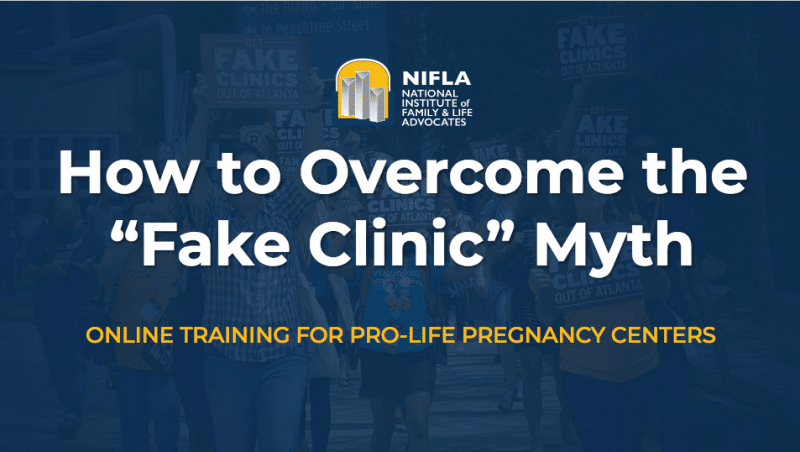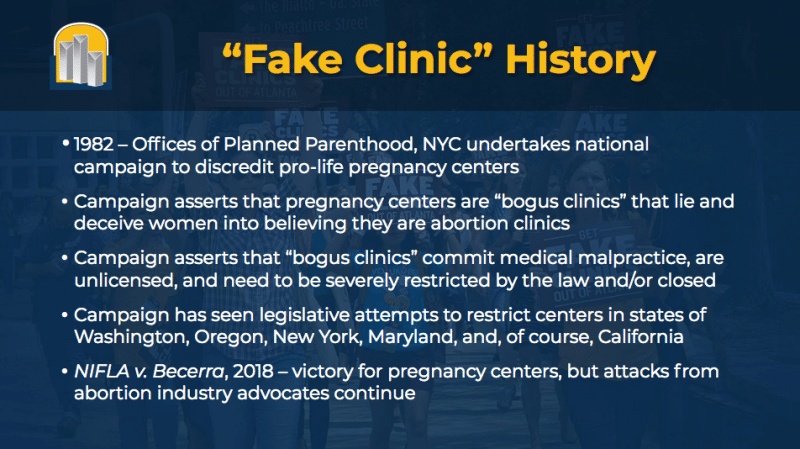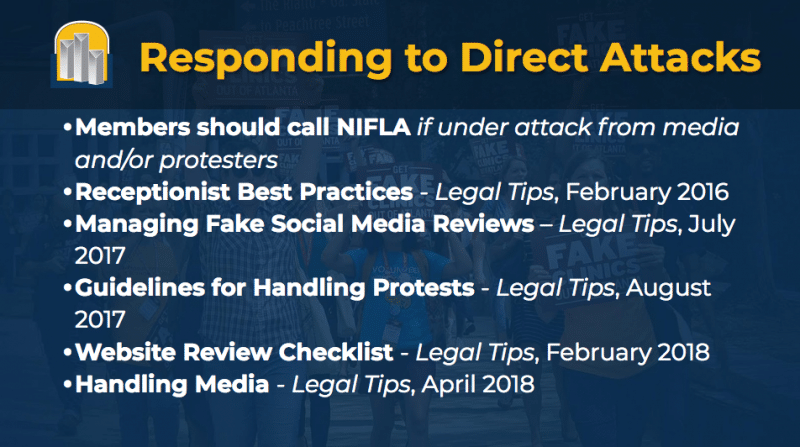How Pregnancy Centers Can Overcome The “Fake Clinic” Myth
The Top 5 Legal Threats to Your Pregnancy Center … and How to Protect Against Them in 2019
November 1, 2018Office for Civil Rights Findings Support NIFLA v. Becerra SCOTUS Ruling
January 23, 2019 For years, abortion industry advocates have sought to discredit pro-life pregnancy centers with the lie that pregnancy centers are “fake clinics.” In a live online training for all pro-life pregnancy centers, NIFLA President Thomas Glessner and Vice President of Legal Affairs Anne O’Connor led an informative discussion about how centers can overcome this myth.
For years, abortion industry advocates have sought to discredit pro-life pregnancy centers with the lie that pregnancy centers are “fake clinics.” In a live online training for all pro-life pregnancy centers, NIFLA President Thomas Glessner and Vice President of Legal Affairs Anne O’Connor led an informative discussion about how centers can overcome this myth.

NIFLA President and Founder Thomas Glessner said attacks on pro-life clinics have significantly increased over the last decade.
“In the last 10 years this campaign has really picked up in its intensity,” said Glessner.
The “fake clinic” myth originated with abortion industry advocates more than thirty years ago. In 1982, Planned Parenthood in New York City began this national campaign to discredit pro-life pregnancy centers. The campaign asserts that these so-called “bogus” health centers commit medical malpractice and are unlicensed while deceiving women into believing they are abortion clinics.

The campaign has also seen legislative attempts to restrict centers in the states of Washington, Oregon, New York, Maryland, and, of course, California – which was the center of NIFLA’s 2018 Supreme Court case, NIFLA v. Becerra. Despite the landmark ruling in favor of pregnancy centers in this case, attacks from abortion industry advocates continue.
Glessner and O’Conner reviewed an article entitled “TOP 10 TACTICS THAT FAKE WOMEN’S HEALTH CENTERS USE TO DECEIVE WOMEN” from the “End the Lies” website run by NARAL Pro-Choice America.
During this free online training the NIFLA leadership team explored each “tactic” pro-life pregnancy centers are accused of using to deceive women while explaining how centers can protect themselves against such accusations.
1. The first two claims made by this pro-abortion article were: pro-life pregnancy centers use “deceptive” advertising and websites.
To guard against this, centers should review their websites and all center materials – such as brochures and pamphlets.
While reviewing this content, ask yourself the following question: Would a reasonable person believe after seeing your ads and/or website that they would be able to get an abortion or abortion referral from you?
If the answer is no, then your center is doing it right!
NIFLA Rule of Thumb:
- Your website and other center materials should contain language that clearly states you DO NOT provide abortion or abortion referrals.
2. Another accusation the pro-choice side uses is the idea that pro-life pregnancy centers have “deceptive interiors.”
Abortion industry advocates claim: “After fake women’s health centers have successfully lured pregnant women to their facilities, they disguise their interiors to further deceive women that they will receive comprehensive care.”
NIFLA Rule of Thumb:
- There is nothing “fake” about being professional because that is what you are. Your center should be professional and look professional.
- If your center is a medical clinic, it should look like one. Have your doctor’s license framed and on a wall in the waiting area. Nurses should wear name badges and be dressed the way nurses dress in clinics in your area.
- Your atmosphere should be warm and welcoming. There is nothing “fake” about this.
3. NARAL’s website claims that pro-life pregnancy centers are “lying about medical facts.”
Abortion industry advocates claim: “Fake women’s health centers give women false, or inaccurate medical information, including claiming that abortions pose health risks such as infertility, breast cancer, and birth defects in future pregnancies.”
NIFLA Rule of Thumb:
- All brochures and documents that include medical information and are given to patients or clients should be first reviewed by your medical director if your center is medical or a private physician if your center is not medical.
- Counselors and Client Advocates should be thoroughly trained to present medical facts and should not give their opinions outside of these facts.
4. Another allegation NARAL’s End the Lies website makes about pro-life centers is that they “push women past important deadlines.”
Abortion industry advocates claim: “Fake women’s health centers will postpone appointments or give women inaccurate due dates, hoping to push people past the legal limit for abortion.”
NIFLA Rule of Thumb:
- Medical clinics should ensure information given to the patient is accurate. Sometimes this means rescheduling them for a later appointment.
- For instance: if the patient is pregnant, she may be too early for an ultrasound exam to confirm pregnancy.
- If this is the situation, the reason for rescheduling must be accurately communicated to the patient. Further, be sure that nurses make professional documentation in the patient file noting these reasons.
5. “Setting up shop near real healthcare facilities” is something the End the Lies website accuses pro-life pregnancy centers of doing to deceive women.
Abortion industry advocates claim: “Many fake women’s health centers set up near comprehensive clinics that offer abortions, and choose similar names for themselves to confuse women and their families.”
NIFLA Rule of Thumb:
- Your center should be located in an area of your community that helps it attract foot traffic.
- Being located near a facility that offers abortion does not, in and of itself, involve deception.
- However: NIFLA recommends centers avoid choosing names similar to abortion providers in your area in order to prevent confusion.
- Center materials should make it perfectly clear that your center does not provide abortions or abortion referrals. In addition, you should make that verbally known to women who inquire both on the telephone and in person.
6. The idea that pro-life pregnancy centers “hide which services are available” is another false narrative this NARAL article promotes.
Abortion industry advocates claim: “Even when directly asked, fake women’s health centers do not disclose that they do not offer abortion services. Instead, fake women’s health centers staff are trained to deflect the question.”
NIFLA Rule of Thumb:
- Always be truthful and honest about the services offered.
- Always ensure that your website, brochure and intake forms clearly state your center does not offer abortions or abortion referrals.
- When asked either on the phone or in person, make it crystal clear that abortion and abortion referrals are not provided by your center.
7. Using “unnecessary and invasive ultrasounds” is one more argument NARAL makes in this article.
Abortion industry advocates claim: “Even the ‘licensed’ fake women’s health centers provide minimal medical care – just pregnancy tests and invasive ultrasounds that are used to manipulate women by showing the fetus or detecting a heartbeat.”
NIFLA Rule of Thumb:
- Ultrasound exams always constitute a medically diagnostic service.
- Thus, they must be performed only when a medical indication exists.
- Under medical guidelines from AIUM such exams are medically indicated to: 1) confirm an intrauterine pregnancy; 2) date the pregnancy; and 3) confirm cardiac activity.
8. Abortion advocates also claim pro-life pregnancy centers “shirk medical liability.”
Abortion industry advocates claim: “Fake women’s health centers specifically avoid taking responsibility for women’s health outcomes after the initial appointments. In fact, they are careful not to set-up or form a ‘patient-physician relationship’ in order to avoid liability.”
NIFLA Rule of Thumb:
Pregnancy medical clinics provide pregnancy diagnosis – not full prenatal care.
- A physician-patient relationship is set up to answer the question a woman is asking: “Am I pregnant?”
- After this question is answered the woman is referred to medical care and the legal physician-patient relationship with the clinic ends.
9. NARAL’s website also accuses pregnancy centers of employing “follow up harassment” with clients.
Abortion industry advocates claim: “After deceiving and scaring women and their families, some fake women’s health centers make women promise to not get an abortion. And, fake women’s health centers have been known to harass women who express an interest in abortion.”
NIFLA Rule of Thumb:
- Once the patient has received all services from the center, the relationship ends.
- Follow up is sometimes necessary when the physician has concerns or specific advisement for the patient.
- All such communications must be consistent with the standard of medical care, with which your medical director is familiar.
In addition to everything we’ve covered here, it’s also important to actively establish a positive narrative for your pregnancy center in the public eye. We’ll be exploring ways pregnancy centers can do this in our future webcasts, so stay tuned to NIFLA’s social media channels for our next online training dates.
In the meantime, be sure to check out this Washington Examiner op-ed by NIFLA Vice President of Legal Affairs Anne O’Connor which highlights the great work of America’s pro-life pregnancy centers! Member centers that need support in dealing with the media or protests should refer to the resources below or contact NIFLA directly.

Did you miss this valuable online training? You can sign up here to listen to a recording of this webcast. We hope you enjoy this preview of the many benefits available to pro-life pregnancy centers through a NIFLA membership.
Don’t wait any longer to find out why your center needs NIFLA in its corner. Call the number below or click here to learn more today!





